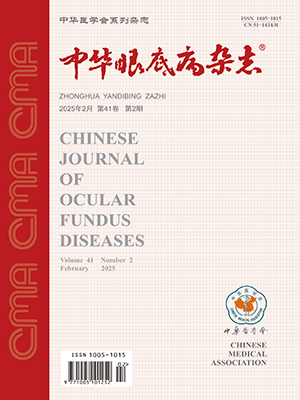| 1. |
张远望. 人工智能与应用[J]. 中国科技纵览, 2015, 10(20): 22. DOI: 10.3969/j.issn.1671-2064.2015.20.020.Zhang YW. Artificial intelligence and application[J]. China Science & Technology Overview, 2015, 10(20): 22. DOI: 10.3969/j.issn.1671-2064.2015.20.020.
|
| 2. |
Gulshan V, Peng L, Coram M, et al. Development and validation of a deep learning algorithm for detection of diabetic retinopathy in retinal fundus photographs[J]. JAMA, 2016, 316(22): 2402-2410. DOI: 10.1001/jama.2016.17216.
|
| 3. |
朱谷雨, 张景尚, 万修华. 人工智能在眼科的应用进展[J]. 国际眼科纵览, 2019, 43(1): 14-18. DOI: 10.3760/cma.j.issn.1673-5803.2019.01.004.Zhu GY, Zhang JS, Wan XH, et al. Artificial intelligence in ophthalmology[J]. Int Rev Ophthalmol, 2019, 43(1): 14-18. DOI: 10.3760/cma.j.issn.1673-5803.2019.01.004.
|
| 4. |
Song P, Yu J, Chan KY, et al. Prevalence, risk factors and burden of diabetic retinopathy in China: a systematic review and meta-analysis[J/OL]. J Glob Health, 2018, 8(1): 010803[2018-08-09]. https://pubmed.ncbi.nlm.nih.gov/29899983/. DOI: 10.7189/jogh.08.010803.
|
| 5. |
Wild S, Roglic G, Green A, et al. Global prevalence of diabetes: estimates for the year 2000 and projections for 2030[J]. Diabetes Care, 2004, 27(5): 1047-1053. DOI: 10.2337/diacare.27.5.1047.
|
| 6. |
Wong TY, Sabanayagam C. The war on diabetic retinopathy: where are we now?[J]. Asia Pac J Ophthalmol (Phila), 2019, 8(6): 448-456. DOI: 10.1097/APO.0000000000000267.
|
| 7. |
Yau JW, Rogers SL, Kawasaki R, et al. Global prevalence and major risk factors of diabetic retinopathy[J]. Diabetes Care, 2012, 35(3): 556-564. DOI: 10.2337/dc11-1909.
|
| 8. |
He J, Cao T, Xu F, et al. Artificial intelligence-based screening for diabetic retinopathy at community hospital[J]. Eye (Lond), 2020, 34(3): 572-576. DOI: 10.1038/s41433-019-0562-4.
|
| 9. |
Shah P, Mishra DK, Shanmugam MP, et al. Validation of deep convolutional neural network-based algorithm for detection of diabetic retinopathy-artificial intelligence versus clinician for screening[J]. Indian J Ophthalmol, 2020, 68(2): 398-405. DOI: 10.4103/ijo.IJO_966_19.
|
| 10. |
Ting DSW, Pasquale LR, Peng L, et al. Artificial intelligence and deep learning in ophthalmology[J]. Br J Ophthalmol, 2019, 103(2): 167-175. DOI: 10.22608/APO.201976.
|
| 11. |
Abràmoff MD, Folk JC, Han DP, et al. Automated analysis of retinal images for detection of referable diabetic retinopathy[J]. JAMA Ophthalmol, 2013, 131(3): 351-357. DOI: 10.1001/jamaophthalmol.2013.1743.
|
| 12. |
Abràmoff MD, Lou Y, Erginay A, et al. Improved automated detection of diabetic retinopathy on a publicly available dataset through integration of deep learning[J]. Invest Ophthalmol Vis Sci, 2016, 57(13): 5200-5206. DOI: 10.1167/iovs.16-19964.
|
| 13. |
Solanki K, Ramachandra C, Bhat S, et al. EyeArt: automated, high-throughput, image analysis for diabetic retinopathy screening[J]. Invest Ophthalmol Vis Sci, 2015, 56(7): 1429.
|
| 14. |
Walton OB 4th, Garoon RB, Weng CY, et al. Evaluation of automated teleretinal screening program for diabetic retinopathy[J]. JAMA Ophthalmol, 2016, 134(2): 204-209. DOI: 10.1001/jamaophthalmol.2015.5083.
|
| 15. |
Ting DSW, Cheung CY, Lim G, et al. Development and validation of a deep learning system for diabetic retinopathy and related eye diseases using retinal images from multiethnic populations with diabetes[J]. JAMA, 2017, 318(22): 2211-2223. DOI: 10.1001/jama.2017.18152.
|
| 16. |
Gargeya R, Leng T. Automated identification of diabetic retinopathy using deep learning[J]. Ophthalmology, 2017, 124(7): 962-969. DOI: 10.1016/j.ophtha.2017.02.008.
|
| 17. |
Ramachandran N, Hong SC, Sime M J, et al. Diabetic retinopathy screening using deep neural network[J]. Clin Exp Ophthalmol, 2018, 46(4): 412-416. DOI: 10.1111/ceo.13056.
|
| 18. |
Li Z, Keel S, Liu C, et al. An automated grading system for detection of vision-threatening referable diabetic retinopathy on the basis of color fundus photographs[J]. Diabetes Care, 2018, 41(12): 2509-2516. DOI: 10.2337/dc18-0147.
|
| 19. |
Yang WH, Zheng B, Wu MN, et al. An evaluation system of fundus photograph-based intelligent diagnostic technology for diabetic retinopathy and applicability for research[J]. Diabetes Ther, 2019, 10(5): 1811-1822. DOI: 10.1007/s13300-019-0652-0.
|
| 20. |
高韶晖, 金学民, 赵朝霞, 等. 糖尿病视网膜病变人工智能机器人辅助诊断系统的建立及应用[J]. 中华实验眼科杂志, 2019, 37(8): 669-673. DOI: 10.3760/cma.j.issn.2095-0160.2019.08.016.Gao SH, Jin XM, Zhao CX, et al. Validation and application of an artificial intelligence robot assisted diagnosis system for diabetic retinopathy[J]. Chin J Exp Ophthalmol, 2019, 37(8): 669-673. DOI: 10.3760/cma.j.issn.2095-0160.2019.08.016.
|
| 21. |
李萌, 王耿媛, 夏鸿慧, 等. 眼底阅片人工智能系统在糖尿病视网膜病变筛查中的临床价值评价[J]. 中华实验眼科杂志, 2019, 37(8): 663-668. DOI: 10.3760/cma.j.issn.2095-0160.2019.08.015.Li M, Wang GY, Xia HH, et al. Clinical evaluation of artificial intelligence system based on fundus photograph in diabetic retinopathy screening[J]. Chin J Exp Ophthalmol, 2019, 37(8): 663-668. DOI: 10.3760/cma.j.issn.2095-0160.2019.08.015.
|
| 22. |
Sosale B, Sosale AR, Murthy H, et al. Medios-an offline, smartphone-based artificial intelligence algorithm for the diagnosis of diabetic retinopathy[J]. Indian J Ophthalmol, 2020, 68(2): 391-395. DOI: 10.4103/ijo.IJO_1203_19.
|
| 23. |
Natarajan S, Jain A, Krishnan R, et al. Diagnostic accuracy of community-based diabetic retinopathy screening with an offline artificial intelligence system on a smartphone[J]. JAMA Ophthalmol, 2019, 137(10): 1182-1188. DOI: 10.1001/jamaophthalmol.2019.2923.
|
| 24. |
Takahashi H, Tampo H, Arai Y, et al. Applying artificial intelligence to disease staging: deep learning for improved staging of diabetic retinopathy[J/OL]. PLoS One, 2017, 12(6): e0179790[2017-06-22]. https://pubmed.ncbi.nlm.nih.gov/28640840/. DOI: 10.1371/journal.pone.0179790.
|
| 25. |
Beede E, Baylor E, Hersch F, et al. A human-centered evaluation of a deep learning system deployed in clinics for the detection of diabetic retinopathy[C/OL]. Association for Computing Machinery. Proceedings of the 2020 CHI Conference on Human Factors in Computing Systems, Honolulu, 2020[2020-08-20]. https://dl.acm.org/doi/fullHtml/10.1145/3313831.3376718.
|




